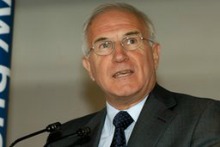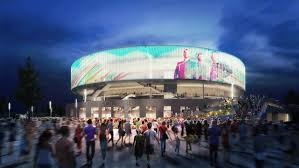Bristol Chamber of Commerce this afternoon entered the heated debate over the location of the long-delayed Bristol Arena by backing the option to build it at Filton.
In a statement released a day after new plans for the original arena site near Temple Meads were unveiled, the chamber’s president Richard Bonner, pictured, said it wanted the “best for the city and the economy of the wider city region”.

He added: “That’s why we support an option that delivers best value derived from the use of public land and borrowing – a high-quality, sustainable mixed development at Temple Island and private sector arena elsewhere, with investment in transport infrastructure.”
And in a clear message to the vocal critics of siting it on privately-owned land at Filton, including former Bristol Mayor George Ferguson, he added: “To move forward and explore these options is far from a betrayal of the city; it’s a sensible and pragmatic approach that deserves to succeed.”
The Chamber’s statement came shortly after its high-profile former chief executive and Metro Mayor election independent candidate John Savage said he also backed an out-of-town arena if it released the Temple Island site for commercial development – a move that he said would bring in much-needed funds for the city council.
In his letter Mr Savage, pictured below, says: “The current unfortunate politicisation of a location for an arena as an isolated matter betrays the absolute need to be aware of, and to strive to achieve, the best uses for all of the limited land available.
“There are better uses for the land at Temple Meads and we have a golden offer for provision of an arena elsewhere within the city and completely at the cost of the private sector. There is now an identified and highly credible private investment proposition for Temple Meads and that includes a much-needed conference centre, a matter that I understand well from my role as chairman of Destination Bristol, the city’s tourism and destination management company, which is a continuing joint venture with the city council.”
The cost of building the arena at Temple Island has reached nearly £190m, according to a value-for-money report commissioned earlier this year from accountancy giant KPMG by Bristol Mayor Marvin Rees.
The report – which has been heavily criticised by those wanting the arena on Temple Island, pictured bottom – analysed the economic cases for and against that location, alternative uses for the site, and the rival Filton location proposed by Malaysian industrial conglomerate YTL, which would use the existing Brabazon Hangar.
It concluded that the council could gain a “significant return” from an alternative use of Temple Island. Mayor Rees is due to announce his decision on the arena’s location at a cabinet meeting on September 4, although opposition party leaders on the council and some members of Mayor Rees’ ruling Labour group, have secured an extraordinary full council meeting the day before to discuss the arena location.
In his statement, Mr Bonner said the chamber did not want the arena decision to be overshadowed by politics.
“We hope partners seize the opportunities presented by this new approach and that development can proceed swiftly at Temple Island,” he said, referring to the scheme unveiled yesterday by Legal & General.
The scheme includes a large capacity conference centre and exhibition space, a 345-room hotel – which would be the city’s largest – and 550 new homes, nearly half of them designated as affordable, and two major office buildings.
Mr Bonner continued: “We are all about what is best for the city and the economy of the wider city region and we strongly support a top-class arena for Bristol that is delivered in a way that brings the most benefit to businesses and residents. Bristol is a successful and thriving city, but investment in housing, business space and transport infrastructure are all needed and are priorities for our members.
“It is right, therefore, to look closely at how public-sector investment for Temple Island can be best used to unlock growth and jobs and support the city in provision of front line services, before committing to action that will impact people who live and work here and challenges the legacy for future generations.
“Bristol Chamber of Commerce & Initiative supports a wider vision of the future development of the whole of the city, including the city centre, and the Temple Meads site is an important part of this. But it is only one part of a much bigger vision that comprises several components including an arena, a conference facility, a five-star hotel and much-needed housing.”
Mr Savage said during 30 years as the leader of the Bristol Initiative and chief executive of the Chamber of Commerce, he was involved with many of the major improvements within Bristol.
“The building of Cabot Circus, and the regeneration of the harbour waterfront are just two examples where the facilitation of private investment has transformed the city. We, the Initiative, had at our peak more than 30 joint venture public/private partnerships,” he said.
“The current unfortunate politicisation of a location for an arena as an isolated matter betrays the absolute need to be aware of and to strive to achieve the best uses for all of the limited land available. There are better uses for the land at Temple Meads and we have a golden offer for provision of an arena elsewhere within the city and completely at the cost of the private sector.

“There is now an identified and highly credible private investment proposition for Temple Meads and that includes a much-needed conference centre, a matter that I understand well from my role as Chairman of Destination Bristol; the city’s tourism and destination management company, which is a continuing joint venture with the city council.
“I have great conviction that the current mayor has performed well against difficult odds and has become an impressive leader. He has successfully, for the moment, dealt with the appalling challenges of reduced funding for local government.
“But the pressure for savings will continue relentlessly and the key council responsibilities, including most importantly for child and adult care, will be a grinding problem for the public purse until a more realistic funding arrangement is secured from government.
“On this point alone, it is unthinkable that the mayor should contemplate the use of over £100m of public money to enable the building of an arena at Temple Meads.
“This highly desirable addition to the cultural provision for the city should and must be at the risk of private enterprise. The alternative location requires no such public intervention apart from the modest cost associated with a short railway link, which would be provided anyway from a different public purse and which would, in any case, be very helpful to the anticipated population in that area.”





























